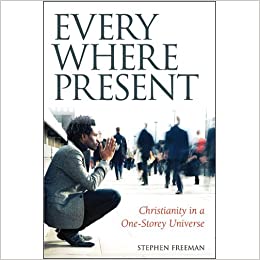For this week, we are concluding our reading of Fr. Stephen Freeman’s book Everywhere Present: Christianity in a One-Storey Universe. Please read Chapter 11, “A Life of Careful Devotion.”
Bridging the Gap
In Chapter 11, Fr. Freeman writes about those practices we should engage in within a one-storey universe. Through these practices, we are not conjuring up God’s presence through certain incantational acts, rather the practices are those disciplines that train our eyes to see and ears to hear the Divine Reality which is always present with us. Our faith is not an abstraction but the very reality in which we live, and move, and have our being.
Fr. Freeman suggests several everyday practices to overcome the false distance between us and God. These practices are:
- Recognize that God is everywhere present and filling all things.
- Always approach the church and the sacraments with awe.
- Make a careful preparation for communion.
- Learn and repeat psalms of presence (e.g. Ps. 23) throughout the day.
- Search for God throughout the day.
- Approach all others with a deep respect and wonder. (Forgive everyone for everything.)
- Give thanks to God for all things.
Fr. Freeman’s list is neither prescriptive nor exhaustive. Different people may have different practices that continuously draw them into the immediate presence of God in the here and now. Think about your own practices? In reviewing Fr. Freeman’s suggestions, where can his suggestions supplement your practices?
The Classical (Anglican) Tradition:
Fr. Freeman ends his book with a reminder that he writes from the perspective of the classical Christian tradition which is generally seen as extending from the first century through the Second Council of Nicaea in 787. During this era, the emphasis of the teachers and writers of the Church was less on what a person had to believe but on who a person is. The doctrine of the Trinity was less about an abstract philosophical point and more about the church and the individual recognizing the persons therein. The questions of death and salvation turned on whether a person was in God’s presence or not rather than whether a person could pass a bible quiz or obeyed a certain moral code. The ultimate goal was not to have perfect beliefs but to be joined with God through Christ.
The Eastern Church may be the best repository of the classical Christian tradition, but Anglicanism is a close second. Beginning with Celtic Christianity which traces its roots back to Joseph of Arimathea’s missionary journey to southern England, pre-Reformation Anglicanism was very much a one-storey religion as shown in the writings as diverse as Bede (672-735) and Julian of Norwich (1343-1416). As C.S. Lewis wrote, when Cranmer crafted our first prayer book during the Reformation, he wished “to be praised not for original genius but for its catholicity and antiquity.” Cranmer’s goal was for the English Church to remain part of the classical Christian tradition, just in English.
Good Anglican theology remains strongly one-storey and incarnational – expressing the conviction that God is revealed in the physical and temporal things of everyday life and the attributes of specific times and places. The best of Anglicanism is also one-storey. (A great book on modern Anglican Orthodoxy and our being rooted in the classical Christian tradition but also living in the modern world is Dean Alan Jones’ book: Common Prayer on Common Ground.)
God, of thy goodness, give me Thyself;
Julian of Norwich
for Thou art enough for me,
and I can ask for nothing less
that can be full honor to Thee.
And if I ask anything that is less,
ever Shall I be in want,
for only in Thee have I all.”

